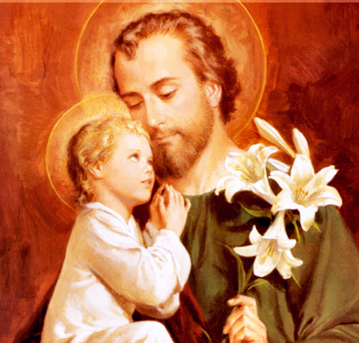|
Month of March: Dedicated to Saint Joseph & the Season of Lent
02 March 2020
“Glorious St. Joseph! Here, here is your place as “Protector of the Universal Church.”... Always be our protector. Let your inner spirit of peace, silence, work, and prayer in the service of the Holy Church always cheerfully enliven us, and we rejoice in union with your Holy Spouse, our sweet and Immaculate Mother, the most steadfast and gentle love of Jesus, the glorious and immortal King of ages and peoples. Amen!” Pope John XXIII
 The month of March is dedicated to St. Joseph. As the head and protector of the Holy Family and a humble carpenter, St. Joseph is the perfect role model for men as a father, husband and worker. He is rightly venerated and loved for his deep faith and heroic virtues of pious humility and charity, perfect obedience and submission to the will of God and his chastity and holiness. As Patron of the Universal Church, he is also a role model for the interior life of priests and the religious.
The month of March is dedicated to St. Joseph. As the head and protector of the Holy Family and a humble carpenter, St. Joseph is the perfect role model for men as a father, husband and worker. He is rightly venerated and loved for his deep faith and heroic virtues of pious humility and charity, perfect obedience and submission to the will of God and his chastity and holiness. As Patron of the Universal Church, he is also a role model for the interior life of priests and the religious.
All that we know about St. Joseph and his role in the Holy Family has been revealed through the Gospels. Though the Gospels are silent on the remainder part of St. Joseph’s life, it is believed that he died peacefully in the loving arms of Jesus and Mary in Nazareth before Jesus began His ministry at the age of 30. Thus he became the patron of a happy death.
Devotion to Saint Joseph is evident in the early Church through the dedication of churches and a feast dedicated to the Saint, in the East, as early as the 4th century. However, the celebration of the Feast of St. Joseph on March 19th began sometime in the 15th century through the efforts of Saints Vincent Ferrer and Bernardine of Siena and the French theologians Pierre D’Ailly and Jean de Charlier de Gerson. It was declared as a day of obligation by Pope Gregory XV. On the Feast of the Assumption of the Blessed Virgin Mary in 1889, the Pope spoke publicly about the devotion to Saint Joseph. In his Encyclical, Quamquam Pluries, Pope Leo XIII stated that it was of “high importance that the devotion to Saint Joseph should engraft itself upon the daily pious practices of Catholics” and that the faithful should be urged to it by “our words and authority”. In 1870, on the Feast of the Immaculate Conception, Pope Pius IX declared Saint Joseph to be the Patron of the Universal Church. Later in 1909, on the vigil of the Feast, Pope Pius X approved the Litany of Saint Joseph for both private and public devotion throughout the Catholic world. In 1955, Pope Pius XII abolished the Feast of the Patronage of Saint Joseph and replaced it with the Feast of Saint Joseph the Worker which is celebrated on May 1 every year.
This month we are also in the Season of Lent – a time marked for deep reflection into our lives and amending our relationship with God. Our time on earth is all we have to decide on how we want to spend our eternal life. It is in the here and now that we need to make a choice about our eternal life.
This Lent, let us truly examine our hearts and make a sincere attempt to recollect all our sins, recognise our weaknesses that are the root causes of our sins and seek grace from God to overcome them. Conversion of heart is a work of grace of God who makes our hearts return to Him. We need His grace to humble ourselves, reflect on our past ways, recognise our sins and admit them with true remorse of having offended a loving Father. This Lent let us focus more on a conversion of heart and seek pardon and more grace through our penances rather than just engage in outward acts of penance without any remorse or change of heart.
In 1989 Pope John Paul II published his Apostolic Exhortation on the person and mission of Saint Joseph in the life of Christ and of the Church called Redemtoris Custos. His Holiness wrote that Our Lady and her Blessed Spouse are “the summit from which holiness spreads all over the earth” and that “what is crucially important here is the sanctification of daily life, a sanctification which each person must acquire according to his or her own state, and one which can be promoted according to a model accessible to all people.”
Let us seek the intercession of Saint Joseph and the Blessed Virgin Mary to help us receive the grace to make this Lent more fruitful and amend our relationship with God so that we may be restored in holiness. Amen.